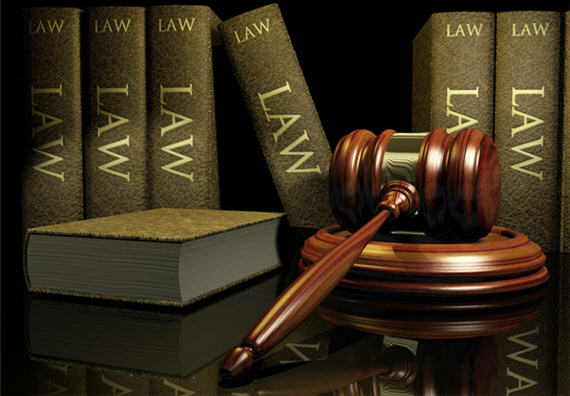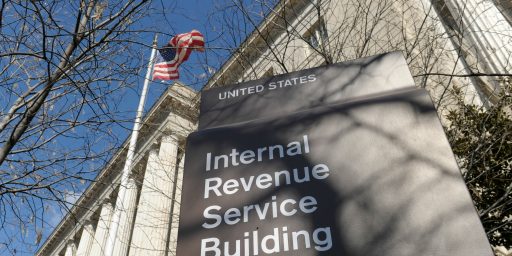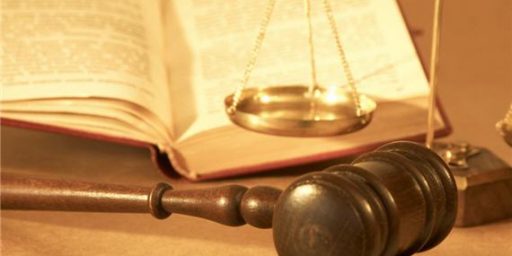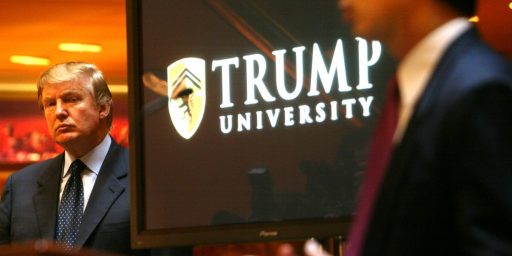Update On The Texas Cheerleader Case
When you look at it a little more closely, the Texas cheerleader case looks to be a case of bad lawyering.
James Joyner’s post on the Texas cheerleader who had her lawsuit against her former school district thrown out, and her appeal rejected by the Supreme Court, generated much heated commentary. So, I thought this background from Eugene Volokh would be of interest:
I think the District Court was mistaken; though the plaintiffs’ claim was rightly rejected, it wasn’t frivolous: There was a plausible argument that the First Amendment should protect the student’s rights in such a situation, though I think it was rightly labeled a losing argument. And the District Court’s analysis struck me as inadequate:
When determining whether a claim is frivolous, unreasonable, or without foundation, a district court should consider (1) whether the plaintiff established a prima facie case, (2) whether the defendant offered to settle, and (3) whether the court held a full trial. Myers v. City of West Monroe, 211 F. 3d 289, 292 (5th Cir. 2000). The court must ask whether “the case is so lacking in arguable merit as to be groundless or without foundation rather than whether the claim was ultimately successful.” Stover, 549 F. 3d at 997-98 (quoting Jones v. Tex. Tech Univ., 656 F. 2d 1137, 1145 (5th Cir. 1981)). As to the first factor, the Court concludes that the Plaintiff failed to establish a prima facie federal claim. In its order dismissing Plaintiff’s suit with prejudice, the Court found that Plaintiffs had failed to allege any facts to support a finding their daughter was denied her rights under the Constitution. As to the second factor, Defendants made no offers to settle. Finally, there was not a full trial as the Court granted Defendants’ motion to dismiss for failure to state a claim. Having considered these factors, the Court finds that Plaintiffs’ Section 1983 action was without foundation. Therefore, as prevailing defendants in an unreasonable Section 1983 action, Defendants Lokey and McInnis are entitled to recover reasonable attorney’s fees.
The three numbered factors are just factors to be considered in the ultimate inquiry, which is whether “the case is so lacking in arguable merit as to be groundless or without foundation rather than whether the claim was ultimately successful.” And I don’t see why the court concluded that this standard was satisfied. (For similar language related to the other part of the attorney fees award, see here.)
But for some reason, the plaintiffs’ lawyer seems not to have opposed the motion for attorney fees before the District Court. (“Plaintiffs have not filed a response to the motion.“) The plaintiffs’ lawyer did argue, after the motion for attorney fees was granted, that “Defendants are premature in their motion for fees and costs since they are only entitled to fees and costs as prevailing parties,” and that they wouldn’t be prevailing parties until the appeal was decided; but I don’t see how that justifies the failure to oppose the motion for attorney fees in the first instance, before it was decided.
The first thing to note is that the award of attorneys fees here was not an award of sanctions under Federal Rule of Civil Procedure 11. That’s unfortunate because Rule 11 allows the sanction to be applied against the attorney who files a pleading as well as the client. Instead, it was an award of attorneys fees under the provisions of 28 USC 1983 and its supporting statutes which provide that the prevailing partymay petition the Court for an award of attorneys fees. Since the school district won, they made the application and the Court judged it under the case law that controls in the Fifth Circuit.
What’s really strikes me here, though, is that the Plaintiff’s attorney seems to have completely screwed up by not filing any kind of written reply to the Defendant’s Motion for Attorneys Fees. Additionally, reading the Court’s opinion, it seems apparent that the Plaintiff’s attorney also didn’t initially follow the proper procedure for seeking a stay of the case pending appeal so that the attorneys fees motion could not be heard until after appeal. Finally, Volokh notes that this attorney also messed up the appeal by not making any argument regarding the award of attorneys fees on appeal, thus waving that issue forever.
I’m not going to go so far as to say that this is malpractice, but it seems pretty darn close, and it brings up the thought I had when I first heard about this case. If this woman and her parents had come to me and told me this story, I would have listened, expressed appropriate outrage, and then informed them that there was nothing I could for them and that it would be a waste of their time and money to pursue a claim that is likely to be dismissed early on. In my opinion, it was irresponsible for this attorney to take this case, and I can only hope that he or she wasn’t charging on an hourly basis and forcing this family to pay for what was essentially a case that was doomed from the start.







Since the attorney fee award was discretionary, it seems pretty cold to hit the young lady with tens of thousands of dollars in attorney’s fees.
@PD: I’d agree except that the alternative is to take the money out of the hide of the school district. Presumably, a couple teachers would lose their jobs in that event.
They’re probably insured; though I understand insurance money isn’t magic money.
My understanding is that the Section 1983 attorney fee award is probably the most liberal (pro-plaintiff) in the country. It used to be true that a plaintiff could lose one of these cases and get their attorney fees reimbursed on the theory that important principles were aired. That’s because the legislators wanted to encourage people to bring civil rights complaints to the court (which often have small pecuniary values, but broader societal implications), and they wanted to build an emergent body of civil rights law on the backs of the litigation.
For me it would have to be a pretty extreme set of circumstances (Taitz level) to hit the lady or her family with fees.
The school district losing 45 grand might be a slight hit on their annual budget. The average family losing 45 grand is so utterly disastrous that it quite likely will cost them every single thing they have.
@Ben,
I don’t disagree but that’s not necessarily a relevant consideration under the law.
@PDShaw
Note that 28 USC 1988, which is the attorneys fees statute for Sec 1983, covers prevailing parties, not just Plaintiffs.
Doug, I understand that, but for a long time, plaintiffs losing these cases could still be considered prevailing parties if important interests were vindicated or beneficial changes resulted from the lawsuit. I think the winds may have shifted though.
I do not understand the law sometimes, why is this considered a frivolous lawsuit? The girl was raped and she was told basically to suck it up, and cheer on the rapist. People get millions of dollars for burning themselves with hot coffee someone hands them, now that`s frivolous. I`m still shaking my head, if this was my daughter i would be so outraged, I am outraged at the support this rapist received.
Barb,
A few points
First, the athlete in question is not a “rapist.” He was charged with sexual assault and ultimately plead guilty to misdemeanor assault. Prior to that here’s what happened.
1. Party where incident happens, charges are made of an attack.
2. The athlete is removed from the team and the school.
3. A Grand Jury investigates the matter and fails to indict on any charges.
4. The athlete returns to school
5. The cheering incident occurs.
It was only several months after No. 5 that another Grand Jury indicted the athlete on sexual assault (not rape) charges. Then, the plea deal was entered.
Doug, you left out a few details….
She was at a party, 3 guys cornered her behind closed doors, she screamed and pleaded for help, other party goers kicked in the door and by which time her attackers had exited via a window….
I have to say Doug, In what world do you live in? Are you really saying that sexual assault is NOT rape? “Ohhh…. it was only a finger (or 2…. or 5…) Do you really want to stand on the pedestal of “It is not rape if a penis is not thrust into a vagina?”
You know the part that got me? She got raped. He didn’t. She was unable to cheer her team. He was able to play for his team.
In my world? I would have bitch slapped her coach. Hell, I would have bitch slapped HIS coach. Then the principle…. and the entire school board….
For Christs sake, we are supposed to educate these children. Just exactly what in, I don’t know anymore.
Hell, “bitch slappin” does not begin to describe what I would do to the punks coach… (in a perfect world…. in this world? I would settle for bitch slapping him in front of his entire team)
Tom,
The school acted crappy. But, the Courts got this case right. There is no Constitutional right to be a cheerleader and this girl’s attorney should be disciplined for filing such a nonsense lawsuit, IMO
mental note to self: Tom P does not believe in innocent until proven guilty.
The schools in a bad spot here; Tom P wants them to act on bare accusations, but if they do that, they might get in trouble on the other end.
What bothers me is that there is a criminal investigation going on in a “he said; she said” area that’s difficult to prove. If the cheerleader is expected to chear for her alleged assailant, the defense will attempt to exploit it. This is a very limited request for a right of non-speech that furthers an important public purpose. I would like someone smarter than me to figure out a fair approach to such a situation, but it’s an imperfect world.